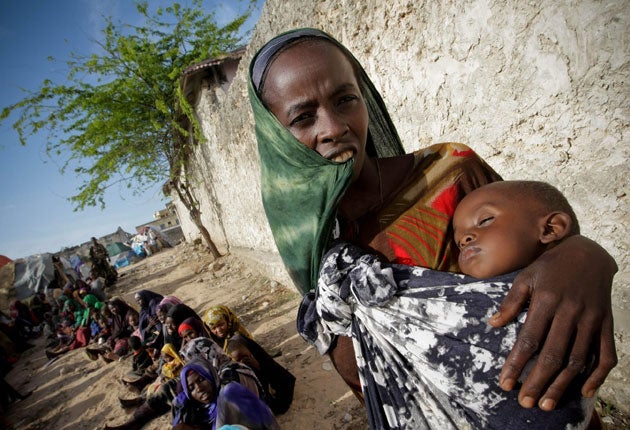Famine victims to get UN aid as Somali militia backs down

Your support helps us to tell the story
From reproductive rights to climate change to Big Tech, The Independent is on the ground when the story is developing. Whether it's investigating the financials of Elon Musk's pro-Trump PAC or producing our latest documentary, 'The A Word', which shines a light on the American women fighting for reproductive rights, we know how important it is to parse out the facts from the messaging.
At such a critical moment in US history, we need reporters on the ground. Your donation allows us to keep sending journalists to speak to both sides of the story.
The Independent is trusted by Americans across the entire political spectrum. And unlike many other quality news outlets, we choose not to lock Americans out of our reporting and analysis with paywalls. We believe quality journalism should be available to everyone, paid for by those who can afford it.
Your support makes all the difference.The United Nations has resumed aid deliveries into Islamist-controlled Somalia in an effort to stem the daily tide of 3,500 famine refugees pouring into neighbouring countries.
Humanitarian assistance was delivered this weekend into central Somalia for the first time since UN operations werehalted 18 months ago following threats and extortion by the radical Islamic militia, the Shabab.
The devastating drought and famine across the Horn of Africa has sent millions of starving people into camps in Ethiopia, Kenya and Somalia. The international response has been hindered by the chaos in Somalia, where foreign aid agencies have been denied access to Shabab-controlled regions.
However, the scale of the crisis has prompted the militia, which is fighting a war with the UN-backed government, to soften its stance and allow in aid groups with "no hidden agenda".
The first shipment of high-nutrition biscuits and other emergency food supplies from UN children's agency Unicef has been airlifted to Baidoa, 120 miles north-west of the capital Mogadishu.
"We are ready to work anywhere in Somalia, provided we get unhindered access to reach the most vulnerable children," said Unicef's Rozanne Chorlton. The Shabab, which controls much of southern and central Somalia, has pledged allegiance to al-Qa'ida and is treated as a terrorist organisation by Western governments.
However, the International Development Secretary, Andrew Mitchell, said: "British aid does not go to Al Shabab. But with one in three people in Somalia in urgent need of assistance, the international community must respond. We channel support through trusted partners, such as Unicef and British charities, to get life-saving help to those who need it most. We do not engage with Al Shabab."
The severity of the drought in the Shabab areas has sent tens of thousands of people into war-torn Mogadishu, up to 2,000 people a day into camps across the border in Ethiopia and 1,500 people a day into the Dadaab complex of camps in northern Kenya.
The UN-run World Food Programme (WFP) ceased operations in the region last year after threats by the Shabab. The WFP said the security of its personnel could no longer be guaranteed but privately officials said the militia was demanding "protection money".
Subscribe to Independent Premium to bookmark this article
Want to bookmark your favourite articles and stories to read or reference later? Start your Independent Premium subscription today.
Join our commenting forum
Join thought-provoking conversations, follow other Independent readers and see their replies
Comments